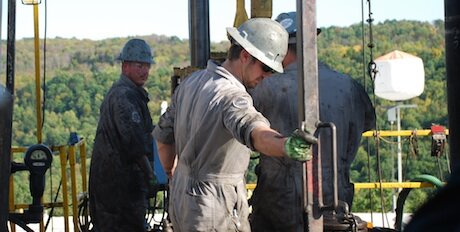Larry Cathles on natural gas...
...in the Cornell Chronicle:
Natural gas as an energy source is a smart move in the battle against global climate change and a good transition step on the road toward low-carbon energy from wind, solar and nuclear power.
That is the conclusion of a new study by Lawrence M. Cathles, Cornell professor of earth and atmospheric sciences, published in the most recent edition of the peer-reviewed journal Geochemistry, Geophysics and Geosystems. Cathles reviewed the most recent government and industry data on natural gas "leakage rates" during extraction, as well as recently developed climate models....
...Cathles' study includes additional findings about expanding the use of natural gas as an energy source, as well as the climate impact of "unconventional" gas drilling methods, including hydraulic fracturing in shale formations. They include the following:
▪ Although a more rapid transition to natural gas from coal and some oil produces a greater overall benefit for climate change, the 40 percent of low-carbon energy benefit remains no matter how quickly the transition is made, and no matter the effect of ocean modulation or other climate regulating forces.
▪ Although some critics of natural gas as a transition fuel have cited leakage rates as high as 8 percent or more of total production during drilling -- particularly hydraulic fracturing extraction -- more recent industry data and a critical examination of Environmental Protection Agency data supports leakage rates closer to 1.5 percent for both conventional and hydrofractured wells.
▪ Even at higher leakage rates, using natural gas as a transition to low-carbon energy sources is still a better policy than "business as usual" with coal and oil, due to the different rates of decay (and hence long-term global warming effect) of carbon dioxide released in greater amounts by burning coal and oil and any methane released during natural gas extraction.
▪ Using natural gas as a transition fuel supports the push to low-carbon sources by providing the "surge capacity" when needed, or a buffer when solar and wind production wanes.
"The most important message of the calculations reported here is that substituting natural gas for coal and oil is a significant way to reduce greenhouse forcing, regardless of how long the substitution takes," Cathles wrote. "A faster transition to low-carbon energy sources would decrease greenhouse warming further, but the substitution of natural gas for other fossil fuels is equally beneficial in percentage terms no matter how fast the transition."
The study can be downloaded at: http://bit.ly/NiAsaG.
Geochemistry, Geophysics and Geosystems is an online journal published by the nonprofit American Geophysical Union. Cathles' research received no outside funding.
- Log in to post comments






